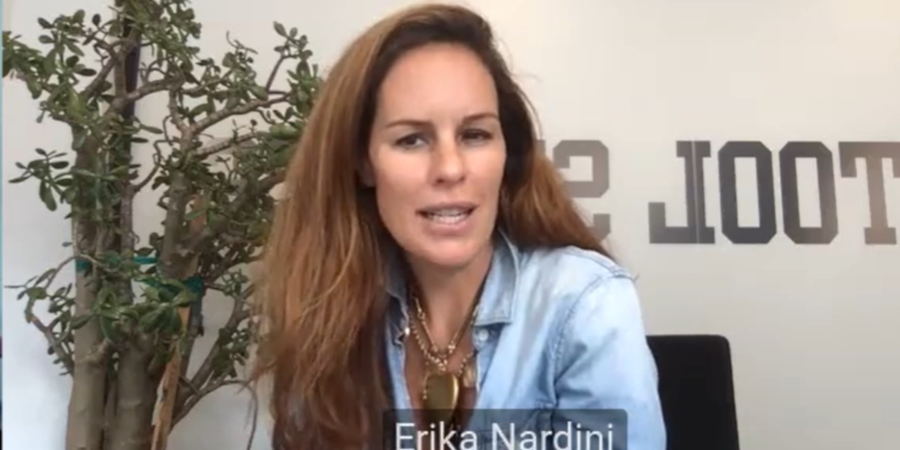Bringing the inaugural SBC Digital North America Summit to a close this week Erika Nardini, CEO of Barstool Sports, held a one-on-one interview with SBC’s US VP Sue Schneider. During the discussion she detailed her firm’s intent in reshaping all dynamics and standard practices related to sports betting.
Echoing a remark made by Penn National’s Jay Snowden on day one of the conference, describing Barstool Sports as a ‘meshing of Sports Center, Howard Stern and reality TV’, Nardini stated: “We are a diamond in the rough.”
Reflecting on her four-year leadership tenure at Barstool, Nardini said she had seen her company defined in all sorts of ways – as a sports blog, social media publisher, influencer platform, and pop culture domain.
While she acknowledged those characteristics, she stated that Barstool’s foundations and successes lay in being a “…business built around people’, providing a platform that covers sports, news, entertainment and lifestyle”.
She revealed: “I worked at Microsoft, when Dave Portnoy created Barstool. At Microsoft we were told to chase eyeballs. We wanted traffic and it didn’t matter where it came from.”
“Meanwhile, Dave conversely wanted people as his business was selling T-shirts and getting people to go to bars. The major companies of the time were obsessed with building companies around traffic…people are more valuable than traffic times a million.”
Nardini maintained that Barstool will be driven by its founding ethos as it partners with Penn National to tackle what has become a disrupted US wagering landscape.
Questioned on the ‘culture clash’ facing the company in forming effective synergies with its heritage land-based casino partner, Nardini reflected: “The cultures are different, but Penn and Barstool are both underdog companies. At Barstool we have gotten to where we are by virtue of our own grit, our smarts and determination. We are hungry to try new things. We sometimes fail but we get up and try again.
“From my observations, Penn is the same, it is a self-made company that knows it has to embrace the future. Jay is thinking about what is next for casinos and sportsbooks.
“They are interested in getting more digital, whilst we are trying to get physical. Some might look at it as a culture clash, but I believe that you have two groups that care about the customer, care about their brands, their consumer connection but are not afraid to shake things up”.
Moving discussions forward, Schneider questioned Nardini on the ‘balancing act’ that Barstool faces transferring its business into a highly regulated marketplace scrutinizing operator behavior.
“Betting is a serious industry for very good reasons,” she responded. “Even before the Penn partnership, we started to look at how we would need to change in light of market developments – what is the compliance we need to introduce, what are the safeguards and protocols and who do we need to hire?”
On safer gambling, Nardini acknowledged that Barstool needs to turn this factor into a big win by tackling gambling addiction in a manner in which people will actually listen. “I believe that we can educate audiences like nobody else can or has tried,” she claimed.
Leading Barstool into new wagering pastures, Nardini underscored the importance of creativity in engaging with US sports audiences, and appeared unimpressed by incumbents’ efforts to date.
“Last March Madness I was watching a Duke game,” she said. “And I witnessed three back-to-back betting commercials with zero originality. They were all the same, I could not tell them apart, nothing made them memorable or stand out.”
Turning to the topic of competitor marketing, Nardini stated that Barstool has no attachment to traditional marketing structures in which companies are fixated with buying airtime or media slots. Penn’s partnership with the firm will instead, she noted, see the two companies combine forces to deliver US wagering’s first mass market proposition.
On the issue of targeting new casual consumers, Nardini aired the concern that US wagering risks being swamped by a vernacular that is bogged down by technical terms and talk of systems, parlays and spreadsheets.
She added that Barstool will shun “algorithmic thinking” as it develops and markets its sportsbook proposition to attract all casual customer segments.
“When you look at the casual bettor, you think about sports fans, I think about women,” she stated. “There is no reason that you can’t ignite betting amongst women, but you have to do it the right way. It has to be compelling and honest. I have seen this in the last year. There are a lot of things that are esoteric and insular about betting, factors which need to be made digestible so people can have fun.”
Commenting on the outlook for Barstool as it begins its sportsbook journey she said: “The world is changing and we have never been a conventional company in any way shape or form. Everyone who works here has grown-up with the internet. As a result I think we understand what our future platform is going to look like. If we combine our content, brand and experience with new technologies it’s limitless what we will achieve.”














